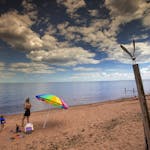As an adult, Ingrid Maslow won ribbons at the Minnesota State Fair for her needlepoint.
It was a gentle art Maslow learned under the most harrowing of circumstances. As a young Jewish girl hiding from Nazi forces in a convent in Belgium, she was taught by the nuns who sheltered her.
Born in Berlin, Germany, in the middle of the Great Depression, Maslow spent much of World War II separated from the rest of her family, trying to avoid the Nazi persecution of Jews that would kill several of her relatives.
As a child on the run, she hid in cellars, slept in ditches and on church pews, stole and begged for food and sold postcards on the street to survive the war in a refugee odyssey that took her from Berlin to Brussels, Belgium; to Dunkirk, France; and, eventually, back to Berlin.
But she did survive, ending up in Minneapolis after the war. She married and raised a family in Golden Valley and later lived in Plymouth. Maslow died Nov. 24 at the age of 86, but not before she returned to the convent in Belgium to thank the nuns who helped save her.
According to a memoir written for her family, Maslow's father, Hans Moser, left his wife and children and fled Germany for Belgium in 1938. He had two reasons to fear being thrown into a labor camp in Nazi Germany. Moser was a Jew and a communist, according to Marc Maslow, Ingrid's son.
In 1938, Ingrid and the rest of the family tried to rejoin him, taking a train to Belgium sponsored by the Belgian Red Cross. Maslow, her brother and her sister made it across the border. But their mother, who was disguised as Red Cross nurse, was arrested for trying to cross illegally.
Maslow was reunited with her father, and spent several months moving from one house to another in Brussels. While hiding in a cellar in a tannery, she remembers hearing a commotion and seeing her mother being brought in, ill and bleeding.
"She kissed Max and me, gave us a Hershey Bar she had somehow gotten, and died," Maslow wrote. Marc Maslow said the family never learned exactly what happened to his grandmother.
After World War II started in 1939, Ingrid Maslow, her father and siblings joined other refugees trying to get to Dunkirk, France, in the hope of eventually reaching England.
For a while, the family was interned in a camp in France. Eventually, they made it back to Brussels, where Maslow sold postcards on the street to German soldiers to survive. It was then that she was sent to live in a convent in Zevekote, Belgium. She wouldn't see her father again until after the war.
When the family was reunited, they took a cattle car to a bombed-out Berlin to try to find the paperwork they needed to immigrate to America. They arrived in New York City in 1947 and from there went to Minneapolis.
She and her siblings lived in foster homes. Her father never adjusted to life in America. He returned to Germany and remarried.
Maslow married a young dentist named Julius Maslow, who was drafted into the Army in 1952 on the same day Maslow's brother, Max, was killed in action fighting for the U.S. during the Korean War.
In 1990, Maslow returned to Belgium, traveled to the convent and found some of the nuns who remembered hiding her and her brother.
"It is impossible to describe my feelings," she wrote of the experience. "I was afraid that if I gave into tears, I'd never stop."
Maslow is survived by her son, Marc, of Minnetonka; daughter, Sharon, of Plymouth; sister, Mona Hickey, of Phoenix, Ariz.; and two grandchildren. Maslow asked for a family-only burial and no shiva.
Richard Chin • 612-673-1775




